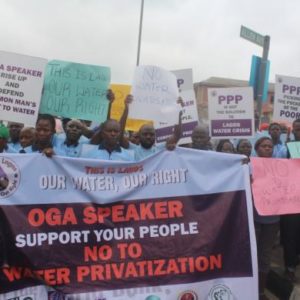“This PPP will not work because we are ready to resist it,” said Okin Oseni, a resident of Lagos’ Ikorodu neighborhood. “There is no job, no road, no security, and the government is thinking of privatizing the only water we have? I would rather die than allow that to happen.”
Oseni spoke out at a community meeting, organized by our partners Environmental Rights Action/Friends of the Earth, Nigeria (ERA). ERA is holding community meetings in neighborhoods across Lagos to build the Our Water, Our Right campaign, which is successfully blocking the privatization of the city’s water system. And we are partnering with them every step of the way to secure a strong public water system in Lagos.
On July 27, 250 Lagos residents marched on the Lagos State House of Assembly and blocked the entrance until members of the government came out to receive their petition, titled “Privatization is not solution to Lagos water problem.”
In the weeks prior, the Speaker of the Lagos State House of Assembly, the Right Honorable Mudashiru Obasa, had said that the only solution for Lagos’ water problems is to privatize.
Primed for privatization
Less than two years ago, privatization seemed inevitable. In the megacity of Lagos, population 21 million, 90 percent of people lack daily access to safe water. Millions rely on informal water sources that can be unreliable, costly, and unsafe. Beginning in the 1980s, the World Bank has pushed for Lagos to privatize its water system, most recently under the misleading name “public-private partnership” (PPP). The pressure to privatize has stunted investment in public water and some of the World Bank’s core recommendations have even been passed into law, causing the water utility to prioritize bill collection, metering, and profitability instead of universal access.
The World Bank has failed in its efforts to improve water service, even by its own estimation.
According to a 2006 report, the “failure of the Bank’s assistance to the Nigerian water supply sector” was evident in the fact that “seven out of seven projects had been rated as unsatisfactory, with unlikely sustainability and with negligible or modest development impact.”
Nevertheless, almost two years ago the World Bank was yet again pushing privatization of water in Lagos.
But then, thanks to the support of our members and with our partners at ERA, we stepped in to expose the ways privatization harms people’s ability to access clean, safe water.
Thanks to the grassroots power ERA has built in Lagos and the pressure we’ve applied on the World Bank, this campaign has caught fire. It is fast becoming a model for how to campaign for universal water access.
The World Bank backs off
By the end of 2015, in response to massive pressure organized by Corporate Accountability International members and ERA activists, the World Bank dropped its goal of privatizing Lagos’ water. It is no longer explicitly supporting water privatization in Lagos after decades trying to make it a reality. This was a great victory.
Harnessing the momentum from the World Bank’s change of course, we must move public officials to invest in the public water system, ensuring the people of Lagos have access to clean, safe water.
“The water privatization plan will fail”
That’s why ERA is holding community meetings across the city, inviting more and more people into the campaign. In neighborhood after neighborhood, people gather to learn about the Lagos government’s plans to privatize their water. ERA organizers brief them on the failure of water privatization in places like Manila, Philippines and Nagpur, India. And they explain how the people of Lagos can stop the privatization and move government to invest in the public water system.
Through these meetings, ERA has built relationships with hundreds of people ready to resist the PPP. Many expressed frustration that the government was failing to provide this most essential service: water access. Many were horrified by the prospect of being charged for using the boreholes they have dug to access water, when they are barely able to make ends meet as it is.
They have responded with a resounding cry for water justice.
Elder Osas Ugagbo from the Ikorodu neighborhood, speaking in Yoruba, called on his community “to wake up from their slumber and take their destinies in their own hands.”
Peace Chidi in the community of Agege said, “We are ready to come out en masse for the women rally anytime. The Lagos government is unfeeling and we believe with grassroots support the water privatization plan will fail.”
Water running from taps that were once dry
The mounting pressure from this organizing is beginning to bear fruit. Recently, some Lagos neighborhoods have seen water begin to run from taps that have been dry for years. This is a direct result of the sustained pressure that the still growing campaign has put on the government. And it is just the beginning.
The July 27 rally is but one of several to take place in the coming months, during which hundreds of people will continue to turn out to demand their right to clean, safe public water. At the same time, we’re working closely with ERA and other allies to chart the way forward to a functioning public water system for the Lagos government.
This is grassroots power that will give the Lagos government no choice but to follow the leadership of the people.
Our win in Lagos will ensure that the people of Lagos are able to realize their human right to water. And it will have reverberations far beyond Lagos, strengthening the global movement for the human right to water.



